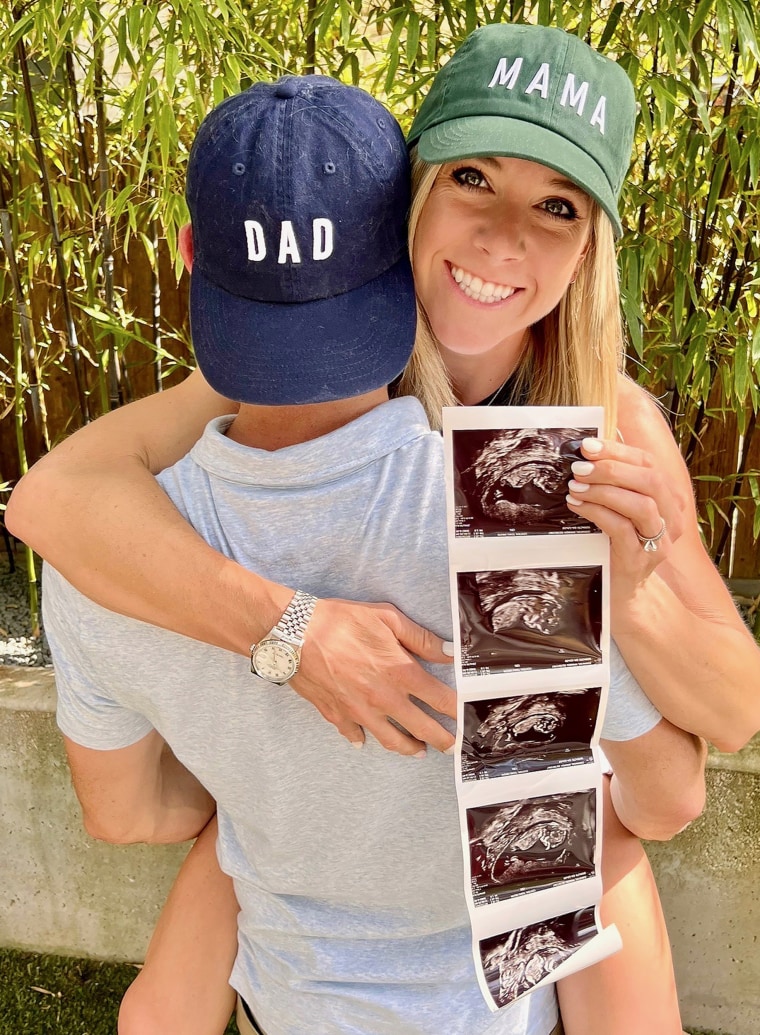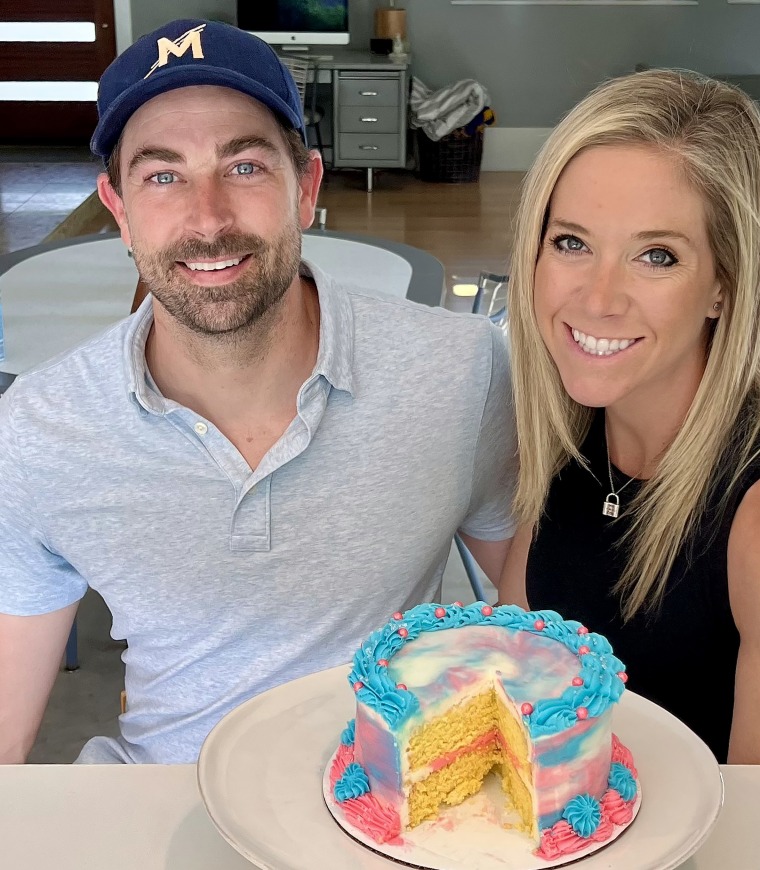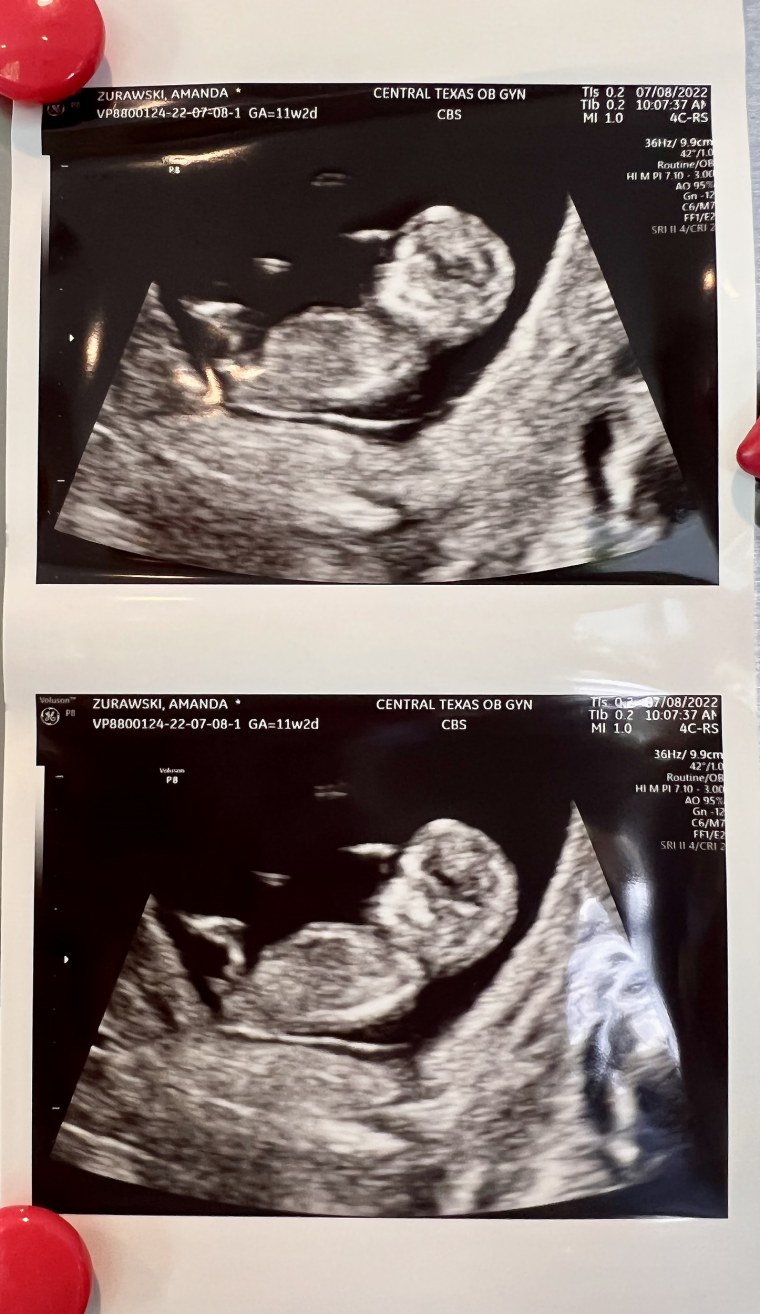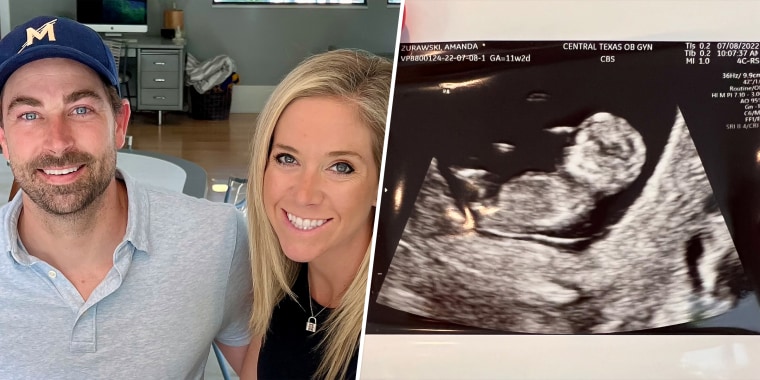Amanda and Josh Zurawski couldn't wait to be "mom" and "dad."
Now, after a heartbreaking pregnancy complication and a new Texas law that required her doctors to wait until her life was in danger before they performed an abortion, Amanda feels lucky just to be alive.
Amanda found out she was pregnant in May of 2022 after more than a year of fertility treatments. She couldn't believe the results of the first at-home pregnancy test, so she took three more: They were all positive.
They excitedly told family and friends. They found out they were having a girl.
Then 18 weeks into the pregnancy, the couple received news that changed the course of their lives and almost ended Amanda's — the pregnancy was no longer viable and possibly life-threatening. Amanda needed an abortion.
In the state of Texas, where she lives, abortion is illegal unless the pregnant person’s life is in danger. Anyone who gives or helps someone obtain abortion care can be charged with a felony and face up to life in prison.
Amanda said doctors did not believe her life was in danger enough for them to provide abortion care without legal risk. The fetal heartbeat would have to stop or Amanda would have to get sicker with a life-threatening condition, she recalls doctors telling her, in order for her to obtain abortion care. Eventually she did get sicker — and it nearly killed her.
“I never in my wildest dreams could have imagined that I was going to be on the brink of death and then recovering in the ICU,” Amanda told TODAY. “It just did not even cross my mind.”
A wanted, celebrated pregnancy
Amanda and Josh, originally from Fort Wayne, Indiana, met in pre-school. After losing touch in college, they reconnected, got married in 2019 and started to build a life together in Austin, Texas.
“I think we always wanted to be parents,” Josh told TODAY Parents. “Once we got married we talked about it, and got serious about family planning in early 2020.”
Amanda, a college athlete and avid runner and cycler, was shocked when she found out her body was no longer ovulating and that she would need to undergo intrauterine insemination (IUI).
“I felt defective,” Amanda said. “Josh was born to be a dad, and it felt like I couldn’t give him the one thing he wants the most in the whole world.”

When Amanda found out she was pregnant, she said at first she was afraid that something would go wrong. After a few weeks she began to enjoy the experience.
On August 22, Amanda noticed an increase in vaginal discharge. The next day, she noticed the same. She went for a walk while waiting for her doctor's office to open.
“As I was walking, I felt like my body was open,” Amanda said. “Which it was, but at the time I didn’t know that.”
Amanda called her husband, who immediately took her to her obstetrician.
“We saw the nurse and she was pretty casual — I don’t think she was expecting anything to be wrong,” Josh said. “She started the exam and got our doctor right away. It didn’t take very long for us to get some bad news.”
'I was in complete shock, disbelief, horror'
That day, Amanda was diagnosed with cervical insufficiency, a condition in which the cervical tissue is weak and opens too early, causing premature birth or miscarriage. She was leaking amniotic fluid. She said doctors told her that her pregnancy was no longer viable.
“I was in complete shock, disbelief, horror, pain and sorrow,” Amanda said. “I had a hard time comprehending what was happening. I was shaking and bawling.”

Cervical incompetency occurs in 1% of pregnancies, according to Yale Medicine.
"Once the cervix is more than 2 cm open, there’s a 50% chance of resulting infection that can only be cured with rapid delivery," Dr. Jenn Conti, an OBGYN who did not treat Amanda but spoke with her and reviewed her medical records, told TODAY. Conti helped found a group called Obstetricians for Reproductive Justice, an organization dedicated to sharing real-time stories of a post-Roe United States.
"Once the amniotic sac is also ruptured, the risk of full body infection and sepsis skyrockets," Conti said.
There was no hope for Amanda's pregnancy, Conti confirmed. Without an abortion, she would get an infection and risk death. But Texas passed a law right after the Supreme Court overturned Roe that bans abortion unless the life of the pregnant person is in danger.
Amanda's life wasn't in enough danger, yet, to justify an abortion. So they had to wait until it was.
'That ultrasound became a beacon of horror'
Once the couple learned there was no hope for their pregnancy, Amanda said she thought she would go into labor, deliver, be monitored in the hospital for a few hours, "and then I'd go home and we could start grieving."
Instead, the couple had to wait.
"Because of the restrictions in Texas, they couldn't induce me even though they knew that the loss of our baby was inevitable," Amanda explained. "There was nothing they could do until her heart stopped beating or my life was in danger."
TODAY Parents reached out to Ascension Seton Medical Center in Austin, where Amanda was treated, for comment, but did not hear back at the time of publication.
The couple considered leaving the state for care, but bordering states Oklahoma, Arkansas, and Louisiana have similar abortion bans. The closest clinic that could provide care was in Colorado — over 600 miles away — and Amanda's condition could deteriorate quickly. In the end, they determined it was not safe to travel.
For three days, Amanda waited at home to get sick enough for an abortion. Several times, she went to the hospital, hoping to get care, she said: Each time, she got an ultrasound and there was still a heartbeat, meaning she could not get an abortion under the law until her condition was "life-threatening."
"Every time they had to do an ultrasound. Previously, those had been such joyous, magical experiences," Amanda added. "Suddenly I was left with the stark reality of wanting to hear her heartbeat and also not wanting to hear her heartbeat, because if I didn't hear it they could induce me and it could just all be over. That ultrasound became a beacon of horror."

On day four, Amanda spiked a slight fever. The couple rushed to the hospital but again had to go back home. On the drive home, Josh said Amanda developed violent chills. By the time they got home, she was incoherent and could barely walk.
Josh raced Amanda back to the emergency room. She had a fever of 102. She was declining rapidly, he said, so doctors decided they could legally provide an abortion by inducing labor.
'On the brink of death'
After delivery, Amanda's health started to once again decline — her blood pressure was low and her blood platelet count dropped.
She had an infection that went septic, Josh said.
Josh called a friend who is an anesthesiologist and started naming the medications Amanda was on, looking for information. One of the medications, Levophed, was administered to treat Amanda's life-threatening low blood pressure.
"He told me that most ICU doctors call it 'Leave 'Em Dead,' because most people go on that medication as a last-ditch effort and they don't make it, because they're that sick," Josh said. "I knew things were bad at that point."
Amanda spent nearly a week in the ICU before making a full recovery.
Amanda has since had surgery to remove scar tissue from her uterus in the hopes that she can get pregnant again. She said she does not know if the operation will be successful or if she will ever be able to carry a pregnancy to term.
Speaking out to honor their daughter
"I had dreamt of childbirth and thought about what it would be like. I was afraid of the epidural and the contractions, but I was also excited because I knew at the end of all that pain I'd have a beautiful, sweet baby," Amanda said. "(Induction) was the most horrific dress rehearsal imaginable."
Amanda and Josh's daughter, Willow, was born 22 weeks early and stillborn. The couple chose her name because willow trees are strong, and they said their daughter was a fighter until the very end.
"She stayed in the room with us for a while," Amanda said. "She was so tiny and cute and perfect. I never did get to feel her kick, but she was great. I was an extremely rambunctious child growing up, but I've known Josh since he was 4 and was such a good kid. Willow never gave me bad pregnancy symptoms — never gave me any grief — so I'd like to think that she was going to be a lot like her dad."
The couple said they decided to share their story to honor Willow.
"I just had this overwhelming feeling of despair for people who are going to go through what we went through," Josh said. "I kept thinking about the single mom with two young kids at home who has no one to drive her to the hospital. Or the people who couldn't take time off work so they tried to 'power through.' Or the people without health insurance, or the young person afraid to tell their parents or friends.
"Amanda almost died. I'm just so scared for everyone else who this is going to happen to," he added.
Amanda and Josh decided to speak to Drs. Heather Irobunda, Jennifer Lincoln and Conti, who recently founded Obstetricians for Reproductive Justice, an organization dedicated to sharing real-time stories of a post-Roe United States.

Dr. Heather Irobunda told TODAY, "I won't have issues with my employment and things like that my livelihood if I speak up, so I felt that it was important to leave that comfort to help others."
All three doctors told TODAY they've treated pregnant patients who have experienced pregnancy complications similar to what happened to Amanda, and needed an abortion as a result.
"It made me livid, sitting across from them knowing this is still happening," Dr. Jennifer Lincoln added. "It also makes me livid, knowing some people will hear their story and think, 'Well, abortion should be OK for people like that but not for people who just get pregnant.' There is no hierarchy of abortion."
Texas is one of 13 states that have banned abortion since Roe v Wade was overturned. In September, Senator Lindsey Graham (R-NC) introduced a bill that would ban abortion nationwide.
TODAY reached out Sen. Graham’s office for comment on the nationwide abortion ban, but did not hear back at the time of publication.
Amanda and Josh said they're already seeing their daughter's legacy in the hearts and minds of others.
"Once we started sharing our story with what actually happened to us, all of our friends and family were just in disbelief that this is what's happening to people," Josh said. "We saw the power of our story immediately help people realize what's happening in Texas and these other states."
Related video:

